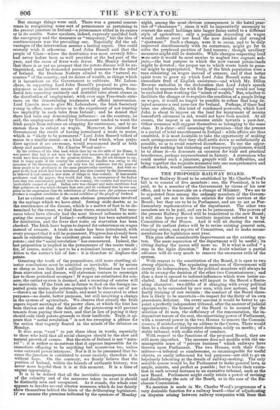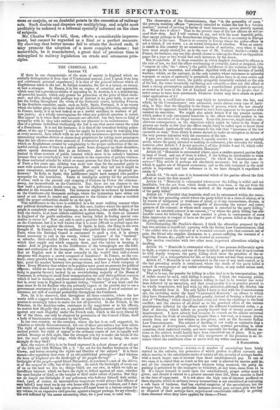THE PROPOSED RAILWAY BOARD.
THE new Railway Board to be established by Mr. Charles Wood's bill is to consist of five members : one, the President, is to be paid, to be a member of the Government by virtue of his new- office, and to be removable on a change of Ministry. Two are to be appointed from among the ordinary members of the Govern ment, and are not to receive salaries-for their services at the Board ; but they are to be in Parliament, and are to act as Par- liamentary representatives of the department. The other two members are to be paid, and are to be permanent. The powers of the present Railway Board will be transferred to the new Board; it will also have power to institute inquiries referred to it by Committees of the House. And it will sit during the recess. One of its earliest duties will be to revise existing general acts, standing orders, and reports of Committees, and to make mem-. mendations for legislation next.year.
This plan offers considerable improvement on the existing sys-: tern. The mere separation of the department will be useful ; its sitting during the recess still more so. It is what is called " a step in the right direction." But we doubt whether a partial advance will do very much to remove the enormous evils of the system.
With respect to the constitution of the Board, it is open to two strong objections. The appointing members of Government will destroy its independence, for the political members will always be able to swamp the decision of the other two Commissioners - and thus a door is opened to indirect influences which were better ex- cluded. And that connexion will impart to the Board a fluctu- ating character ; two-fifths of it changing with every political change, to be succeeded by new men, with new notions, and the faulty ;raining of raw recruits : the conduct of the Board there- fore is likely, to be uncertain—its respect for the fixity of its own precedents deficient. On every account it would be better to ap- point a perfectly independent tribunal, after the manner of judicial appointments ; the honesty of the Board to be secured by the selection of fit men, the sufficiency of the remuneration, the in- dependent tenure of seat, the supervising power of Parliament; with a reserved power in the two Houses to remove the Commis- siouers, if misbehaving, by an address to the Crown. There would then be a chance of independent decisions, solely on merits ; of a stable tribunal, with stable rules of conduct.
With respect to the functions of the proposed Board, they are still more imperfect. The measure does not meddle with the un- manageable mass of "private business" which railways have thrown upon Parliament. The two Houses, with their Com- mittees—a tribunal so cumbersome, so unmanageable for useful objects, so easily influenced for bad purposes—are still to go on hopelessly labouring at the details of railway-making. The only sensible course would be, for Parliament to make general laws, as ample, minute, and perfect as possible ; but to leave their execu- tion in each several instance to an executive tribunal, such as the new Board. Parliament might easily retain a power of revising and disallowing the acts of the Board, as in the case of the En- closure Commission.
No mention is made in Mr. Charles Wood's programme of .s very desirable function for a railway board—that of adjudicating on disputes arising between railway companies with lines that
cross or conjoin, or on doubtful points in the execution of railway acts. Such doubts and disputes are multiplying, and might most profitably be referred to a tribunal specially informed on the class of subjects.
Mr. Charles Wood's bill, then, effects a considerable improve- ment, but cannot be regarded as a final or a perfect measure. By showing that better means fail to attain the desired ends, it may promote the adoption of a more complete scheme ; but meanwhile, be it remembered, a great deal of precious time is misapplied to railway legislation on crude and erroneous prin- ciples.



























 Previous page
Previous page